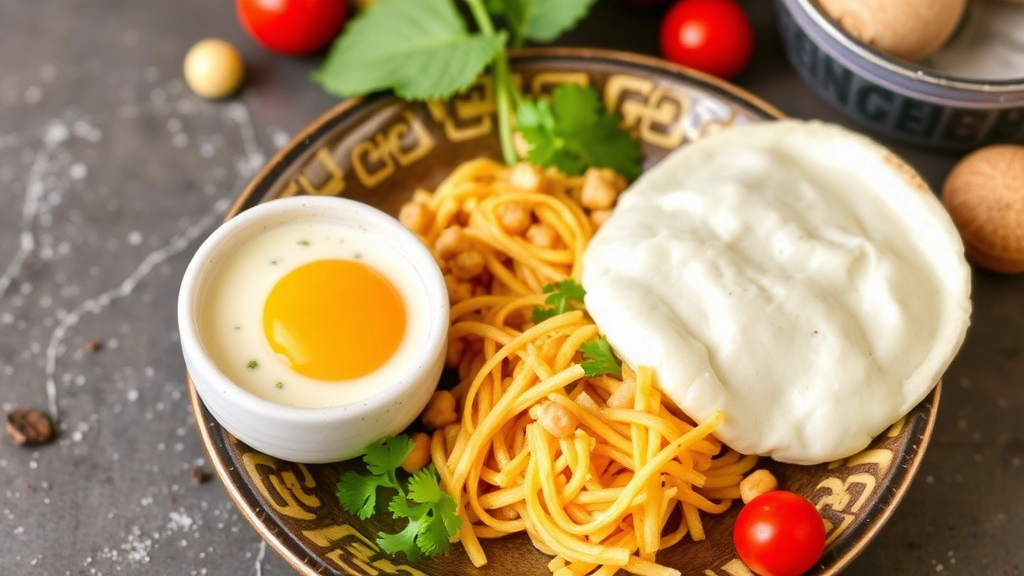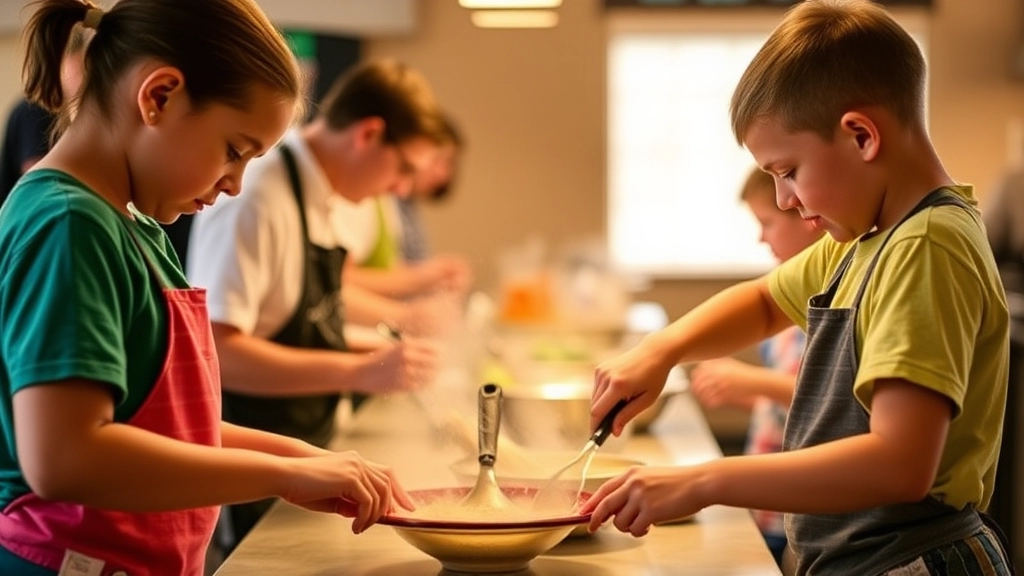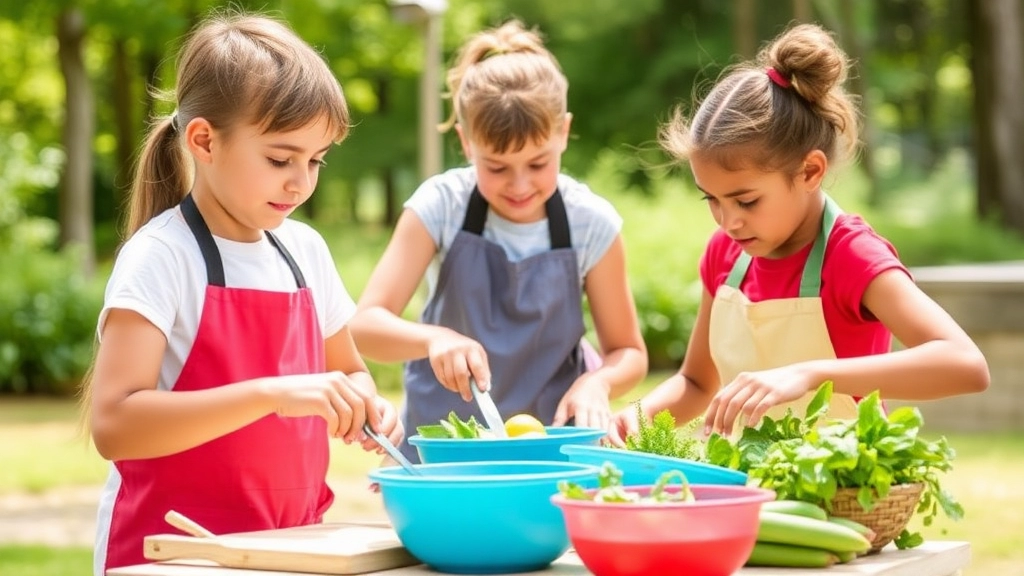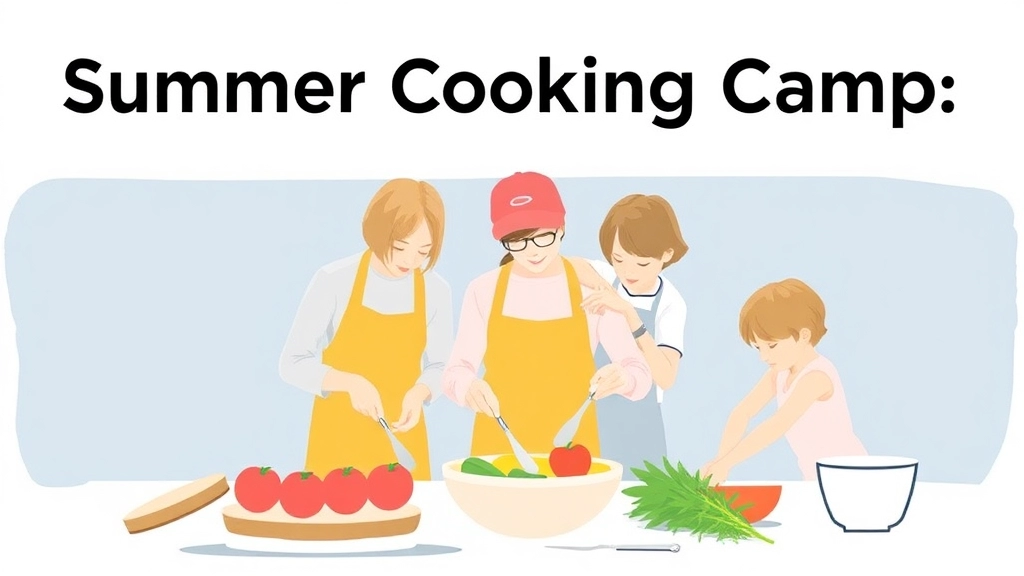Transform Your Child’s Summer
Are you ready to transform your child’s summer into an unforgettable culinary adventure? Welcome to the world of Summer Cooking Camps, where kids and teens not only learn to cook delicious meals but also gain invaluable life skills. From beginner to advanced levels, these camps cater to all age groups and skill sets, ensuring every child finds their perfect fit.
Benefits of Summer Cooking Camps
Imagine your child mastering kitchen safety, exploring international cuisines, and even accommodating specific dietary needs—all while having a blast! Whether it’s a day camp or a residential experience, the benefits are immense. They’ll build confidence, foster creativity, and make lasting memories.
Discover the Best Camps
Dive into our comprehensive guide to discover the best summer cooking camps of 2024 and how to choose the right one for your aspiring chef.
Types of Summer Cooking Camps Available
Alright, so you’re thinking about summer cooking camps. Maybe you’re wondering, “What types are out there?” or “Which one is right for my kid?” Let’s break it down.
Day Camps vs. Residential Camps
First off, you’ve got Day Camps and Residential Camps. Day camps are perfect if you want your kid to learn cooking skills but still come home every night. These typically run from morning till afternoon. Residential camps, on the other hand, are full-on immersive experiences. Your kid will stay overnight, usually for a week or more, diving deep into the culinary world.
Skill-Based Camps
Next up, there are Skill-Based Camps. These are tailored to different skill levels:
- Beginner Camps: For kids who can barely make toast.
- Intermediate Camps: For those who can whip up a basic meal but want to learn more.
- Advanced Camps: For the budding chefs who are already experimenting with recipes and techniques.
Themed Cooking Camps
Then, we have Themed Cooking Camps. These are super fun because they focus on specific cuisines or cooking styles. Here are some popular themes:
- Baking Camps: Perfect for those with a sweet tooth.
- International Cuisine Camps: Learn to cook dishes from around the world.
- Farm-to-Table Camps: Focus on using fresh, local ingredients.
- Healthy Cooking Camps: Great for learning nutritious recipes.
Specialty Camps
Lastly, there are Specialty Camps. These cater to specific dietary needs or interests:
- Vegan or Vegetarian Camps: For those who avoid meat.
- Gluten-Free Camps: Ideal if your child has gluten sensitivities.
- Allergy-Friendly Camps: Designed to accommodate various food allergies.
Real Questions and Worries
Now, you might be thinking, “What if my kid has never cooked before?” or “Will they be safe in the kitchen?” Trust me, these camps are designed with safety and learning in mind. They start with the basics and make sure your child is comfortable and confident.
Internal Linking Opportunities
Curious about the age groups these camps cater to? Check out our detailed section on Summer Camps for 4-Year-Olds. And if you’re concerned about kitchen safety, we’ve got you covered in Summer Camp Signage: Design, Safety, and Fun.
So, there you have it. Whether your kid is a beginner or a mini Gordon Ramsay, there’s a summer cooking camp out there that’s just right for them. Dive in and explore the optionsâyour future chef will thank you!
Age Groups and Skill Levels Catered To

Ever wondered if cooking camps are just for older kids?
Or maybe you’re concerned about your child’s skill level and if they’ll fit in?
Let’s break it down.
Age Groups:
Cooking camps cater to a wide range of age groups.
From young kids to teenagers, there’s something for everyone.
- Young Chefs (Ages 6-9): These camps focus on basic skills. Think simple recipes and fun kitchen activities.
- Junior Cooks (Ages 10-13): Here, kids learn more complex dishes. They start to understand flavours and techniques.
- Teen Chefs (Ages 14-18): Advanced skills come into play. Teens tackle gourmet recipes and even plating techniques.
Skill Levels:
No need to worry if your child is a beginner.
Camps are designed to meet kids where they are.
- Beginner: Perfect for kids who are new to the kitchen. They’ll learn the basics like chopping and measuring.
- Intermediate: For those who know their way around the kitchen. They’ll dive into more complex recipes.
- Advanced: Ideal for teens who might be considering a culinary career. They’ll get into advanced techniques and presentation.
Why It Matters:
Matching the right age group and skill level ensures your child gets the most out of the camp.
They’ll feel confident and engaged, not overwhelmed or bored.
Real Concerns, Real Solutions:
- Worried your young one will be out of their depth? Don’t be. Camps for younger kids are all about fun and safety.
- Think your teen might find it too easy? Advanced camps will challenge them and keep them interested.
Examples:
- Little Chefs Camp: For ages 6-9, focusing on fun and basic skills.
- Teen Gourmet Bootcamp: For ages 14-18, diving into advanced culinary arts.
Key Takeaways:
- Age-specific camps ensure appropriate learning.
- Skill levels are catered to, from beginners to advanced.
- The right match boosts confidence and engagement.
So, when choosing a cooking camp, consider your child’s age and skill level.
It makes all the difference.
And hey, who knows?
You might just have the next top chef in your family.
Internal Links:
- Types of Summer Cooking Camps Available
- Popular Culinary Themes and Activities
- How to Choose the Right Cooking Camp
Related Keywords:
- Cooking camps for kids
- Culinary camps for teens
- Beginner cooking classes for children
Hands-On Learning and Kitchen Safety in Cooking Camps
Ever wondered how to get kids excited about cooking without worrying about them burning the house down? Yeah, me too. Let’s dive into the nitty-gritty of hands-on learning and kitchen safety in cooking camps. Trust me, this is where the magic happens.
Why Hands-On Learning Rocks
Kids don’t learn by watching; they learn by doing. Cooking camps take this to heart. Here’s why hands-on learning is a game-changer:
- Engagement: Kids stay focused when they’re actually mixing, chopping, and cooking.
- Retention: They remember what they did, not what they saw.
- Confidence: Mastering a recipe builds self-esteem faster than you can say “soufflé.”
Kitchen Safety: The Real MVP
Alright, let’s get real. The kitchen can be a danger zone. Sharp knives, hot stoves, and slippery floors are no joke. So, how do cooking camps keep it safe while keeping it fun?
- Basic Safety Rules: First off, they drill in the basics. No running, no touching hot surfaces, and always handle knives carefully.
- Supervision: There’s always an adult in the room. Period. Whether it’s a chef or a camp counsellor, someone’s got eyes on the action.
- Proper Equipment: Kids use age-appropriate tools. Think plastic knives for the young ones and real, but safe, kitchen gear for teens.
Breaking Down Kitchen Safety Tips
Sometimes, bullet points help make things clearer:
- Knife Skills: Teach them to always cut away from their body.
- Heat Awareness: Make sure they know which parts of the stove are hot and how to use oven mitts.
- Cleanliness: Emphasise washing hands and surfaces to avoid cross-contamination.
- Emergency Procedures: Show them where the fire extinguisher is and how to use it.
Stories from the Trenches
Let me tell you about a kid named Jake. He was terrified of the stove. Thought it was going to explode or something. After a week at cooking camp, he was flipping pancakes like a pro. All because he got hands-on experience in a safe, supervised environment.
Internal Linking Opportunities
For more on age-specific skills, check out our section on types and benefits of summer camps. And if you’re curious about the kinds of recipes they tackle, head over to art activities and benefits.
The Bottom Line
Hands-on learning and kitchen safety are the backbone of any good cooking camp. They turn hesitant kids into confident young chefs, all while keeping the kitchen a safe space. If you’re considering a cooking camp for your child, make sure these elements are front and centre. They’re not just learning to cook; they’re learning life skills that’ll stick with them forever.
Popular Culinary Themes and Activities

Ever wondered what culinary themes make a summer cooking camp a hit?
Let’s dive in.
1. International Cuisine Adventures
Kids love exploring new flavours. Imagine them whipping up Italian pasta, Japanese sushi, or Mexican tacos. It’s like travelling the world without leaving the kitchen.
2. Farm-to-Table Experiences
Fresh ingredients, straight from the source. These camps teach kids to appreciate where their food comes from. They might even visit local farms.
3. Baking Bonanza
Cakes, cookies, and bread. Who doesn’t love baking? Kids learn the science behind baking and get to eat their delicious creations.
4. Healthy Eating
With all the junk food around, this one’s crucial. Kids discover how to make nutritious meals that taste great. They might even start enjoying veggies.
5. Dessert Masterclass
Think chocolate, ice cream, and pastries. Kids go wild for this. They learn to create sweet treats that could rival any bakery.
6. Holiday-Themed Cooking
Christmas cookies in July? Why not? Camps often feature holiday-themed cooking sessions. It’s festive and fun.
7. Food Science and Molecular Gastronomy
For the budding scientist. Kids get to explore the chemistry of cooking. Think edible experiments and food that looks like it’s from a sci-fi movie.
8. Street Food Extravaganza
From food trucks to market stalls. Kids recreate popular street foods from around the globe. It’s all about bold flavours and quick bites.
9. Cooking Competitions
Friendly contests to see who can whip up the best dish. It’s fun, engaging, and teaches teamwork.
10. Special Diets
Gluten-free, vegan, or allergy-friendly. Kids learn to cook meals that cater to specific dietary needs. This promotes inclusivity and understanding.
These themes aren’t just about cooking. They’re about creating memorable experiences. Kids leave camp with new skills, friends, and a passion for food.
Day Camps vs. Residential Cooking Camps
Alright, let’s dive into something a lot of parents and teens are asking: Day Camps vs. Residential Cooking Camps. Which one is the best fit for you? Let’s break it down.
What Are Day Cooking Camps?
Day cooking camps are like your regular 9-to-5 job, but way more fun. You drop off your kid in the morning, they cook up a storm, learn some cool skills, and you pick them up in the afternoon. These camps are perfect if:
- You live nearby and commuting isn’t a hassle.
- Your child is younger and not ready for an overnight stay.
- You want to save some cash because day camps are generally cheaper.
Day camps are also great for kids who might have other activities lined up during the summer. They get to enjoy cooking without missing out on their other interests.
What Are Residential Cooking Camps?
Residential cooking camps, on the other hand, are the full package. Your child lives, eats, and breathes cooking for a week or two. These camps are ideal if:
- Your kid is older and ready for a bit of independence.
- They are super passionate about cooking and want an immersive experience.
- You want them to make new friends from different places.
Residential camps often offer more in-depth programs, more complex recipes, and a real taste of what life in a professional kitchen might be like.
Key Differences Between Day and Residential Camps
| Feature | Day Camps | Residential Camps |
|---|---|---|
| Duration | 6-8 hours daily | 24/7 for a week or more |
| Cost | Generally cheaper | More expensive due to lodging |
| Independence Level | Lower, more supervised | Higher, more self-reliance |
| Social Interaction | Limited to daily sessions | Extensive, lasting friendships |
| Depth of Learning | Basic to intermediate skills | Advanced, immersive experience |
Personal Stories: The Best of Both Worlds
I remember chatting with a friend whose daughter attended a day camp last summer. She loved it, but she felt like she was just getting into the groove when it was time to go home. This year, they’re trying out a residential camp to see if a more immersive experience suits her better.
Another mate’s son, on the other hand, started with a residential camp and found it a bit overwhelming. They switched to a day camp and it was a perfect fit. He got to learn at his own pace and still had time for his summer football league.
How to Choose the Right Type of Camp
So, how do you decide which camp is the right fit? Here are some pointers:
- Assess your child’s readiness: Are they comfortable staying away from home?
- Consider your budget: Can you afford a residential camp, or is a day camp more feasible?
- Think about the learning experience: Does your child need a deep dive or just a fun, educational activity?
For more tips on making the best camp choice, check out our 2024 Summer Camp Guide.
Life Skills Learned at Summer Cooking Camps

Ever wondered what your kid’s really getting out of a summer cooking camp?
Sure, they learn to make a killer lasagne, but there’s so much more going on behind the scenes.
Let’s break it down.
1. Teamwork and Communication
Cooking isn’t a solo gig.
Kids work in teams, learning to communicate effectively to get the job done.
They’ll need to:
- Delegate tasks: Who’s chopping, who’s stirring?
- Solve problems: What happens if the dough’s too sticky?
- Share ideas: “How about adding a pinch of this?”
These skills translate directly into real-life scenarios.
2. Time Management
Cooking is all about timing.
They’ll learn to:
- Plan ahead: What’s the prep time vs. cook time?
- Multitask: Stir the sauce while boiling pasta.
- Prioritise: What needs to be done first?
Mastering these skills helps kids manage schoolwork, extracurricular activities, and even future job responsibilities.
3. Creativity and Innovation
Cooking is an art.
Kids get to experiment with:
- Flavours: Mix and match ingredients.
- Textures: Crunchy, smooth, chewy.
- Presentation: Make it look as good as it tastes.
This fosters a creative mindset that can be applied to any field.
4. Self-Confidence
There’s nothing like the feeling of making something from scratch.
Kids gain:
- Pride in their work: “I made this!”
- Resilience: Learning from mistakes.
- Independence: Taking charge in the kitchen.
These experiences build a strong sense of self-worth.
5. Nutritional Awareness
Kids learn what goes into their food.
They’ll understand:
- Ingredients: Fresh vs. processed.
- Portion sizes: What’s a healthy serving?
- Balanced meals: Combining proteins, carbs, and veggies.
This knowledge sets them up for a healthier lifestyle.
6. Financial Literacy
Cooking on a budget is a real skill.
They’ll learn to:
- Plan meals: What can you make with £10?
- Reduce waste: Use leftovers creatively.
- Shop smart: Compare prices and find deals.
These lessons are invaluable for future independence.
Real Talk: Why This Matters
I remember my first cooking camp.
I was a mess in the kitchen.
Burnt toast, overcooked pasta, you name it.
But I learned.
I grew.
And those skills?
They stuck with me.
So, don’t just think of summer cooking camps as a way to keep your kids busy.
Think of them as a way to equip your kids with life skills they’ll use forever.
After all, who doesn’t want a kid who can whip up a gourmet meal and manage their time like a pro?
That’s the real deal.
Ready to Dive In?
Now that you know the life skills your kids can gain, why not explore some options?
Check out our guide on How to Choose the Right Cooking Camp for more tips.
And if you’re curious about the best camps out there, we’ve got you covered with our list of Top Summer Cooking Camps in 2024.
Keep it fresh, keep it real, and let’s get cooking!
Special Accommodations: Dietary Needs and Allergies
Ever wondered how summer cooking camps handle dietary needs and allergies? It’s a big concern for many parents. You want your kid to enjoy the camp but also stay safe, right? Let’s dive into how these camps tackle these issues head-on.
Understanding Dietary Needs and Allergies
First off, summer cooking camps know that not every kid can eat everything. Whether it’s gluten intolerance, nut allergies, or specific dietary preferences, camps are on it. They ensure that everyone can join in without worry.
How Camps Adapt
Here’s how camps make it work:
- Custom Menus: Many camps create custom menus that cater to various dietary needs. This means your kid can still whip up a storm in the kitchen without missing out on the fun.
- Trained Staff: Staff are trained to handle food allergies. They know the ins and outs of cross-contamination and how to keep things safe.
- Communication: Camps often ask for detailed info about your child’s dietary needs before the session starts. This way, they’re prepared from day one.
Real Stories from the Camp Kitchen
Imagine this: Jane, a 10-year-old with a severe nut allergy, joins a cooking camp. Her parents are worried but hopeful. The camp’s staff not only create nut-free recipes but also teach Jane how to read labels and identify safe foods. By the end of the camp, Jane’s not just cookingâshe’s confident about managing her allergy.
Why It Matters
Accommodating dietary needs isn’t just about avoiding certain foods. It’s about:
- Inclusivity: Making sure every child feels included and can participate fully.
- Education: Teaching kids about their dietary needs empowers them for the future.
- Peace of Mind: Giving parents the assurance that their child is in safe hands.
Choosing the Right Camp
When you’re picking a camp, consider these tips:
- Research: Look for camps that highlight their focus on dietary accommodations.
- Ask Questions: Don’t hesitate to ask about their policies and how they handle allergies.
- Read Reviews: Other parents’ experiences can give you insights into how well a camp manages dietary needs.
For instance, you might find some great options in our guide to top Port St. Lucie summer camps for kids or explore the benefits and activities detailed in our summer reading camps.
Benefits of Summer Cooking Camps for Kids and Teens

Ever wondered why summer cooking camps are the talk of the town?
Well, let’s dive into why they’re more than just a fun way to spend the holidays.
1. Building Confidence in the Kitchen
Kids and teens get hands-on experience.
They learn to chop, sauté, and bake.
By the end of the camp, they’re not just following recipes—they’re creating them.
2. Developing Essential Life Skills
Cooking is a life skill.
It teaches planning, organisation, and time management.
Plus, it’s a fantastic way to understand nutrition and healthy eating.
3. Fostering Creativity
Cooking is an art.
Kids get to experiment with flavours and ingredients.
They discover what works and what doesn’t.
It’s like a science experiment, but tastier.
4. Encouraging Teamwork and Social Skills
In a cooking camp, teamwork is key.
Kids learn to work together to create a meal.
It’s a great way to make new friends and improve social skills.
5. Understanding Kitchen Safety
Safety first, right?
Cooking camps emphasise kitchen safety.
Kids learn how to handle knives, hot surfaces, and other kitchen hazards.
6. Boosting Academic Skills
Cooking involves maths and science.
Measuring ingredients, understanding chemical reactions—it’s all part of the process.
It’s learning without even realising it.
7. Catering to Dietary Needs and Allergies
Many camps offer special accommodations.
Whether it’s gluten-free, vegan, or allergy-friendly, there’s something for everyone.
8. Fun and Engaging Activities
Cooking camps aren’t just about cooking.
There are games, competitions, and themed days.
It’s a holistic experience that’s both educational and entertaining.
9. Preparing for the Future
Some kids might discover a passion for cooking.
It could lead to a future career in the culinary arts.
Or, at the very least, they’ll always know how to whip up a great meal.
10. Creating Lasting Memories
The experiences and friendships made at camp are unforgettable.
It’s a summer well spent, filled with laughter, learning, and delicious food.
In short, summer cooking camps for kids and teens offer a wealth of benefits.
From building confidence to fostering creativity, these camps are more than just a way to pass the time—they’re a recipe for growth and fun.
How to Choose the Right Cooking Camp
Alright, so you’re thinking about sending your kid to a summer cooking camp. Awesome choice! But how do you pick the right one? That’s a real question many parents face. Let’s break it down, no fluff, just the essentials.
Start with Your Kid’s Interests and Skill Level
First things first: What does your kid like to cook? Are they into baking, grilling, or maybe international cuisine? Knowing their interests can help you narrow down the options. Also, consider their skill level. Are they beginners who need to learn the basics, or are they budding chefs looking to refine their skills?
Check the Camp’s Curriculum and Activities
Next up, dive into the camp’s curriculum. Make sure it covers a range of cooking techniques and recipes that will keep your child engaged. Look for camps that offer a mix of hands-on cooking, kitchen safety lessons, and maybe even some fun food science experiments. A well-rounded curriculum is key.
Consider Camp Duration: Day Camps vs. Residential Camps
Day Camps are great if you want your kid to come home every night. They usually run from morning to late afternoon. Residential Camps, on the other hand, offer a more immersive experience where kids stay overnight. Think about what fits best with your family’s schedule and your child’s comfort level.
Look for Certified Instructors and Safe Environments
Safety first, always. Make sure the camp has certified instructors who know how to teach kids safely. Check if they have proper kitchen safety protocols in place. You want a camp that not only teaches cooking but also emphasizes safety.
Read Reviews and Get Recommendations
Do your homework. Read reviews from other parents and see what they have to say. Better yet, ask around in your community or social media groups for recommendations. Real-life experiences can give you a good idea of what to expect.
Special Accommodations: Dietary Needs and Allergies
If your child has dietary restrictions or allergies, make sure the camp can accommodate them. This is non-negotiable. A good camp will have protocols in place to handle special dietary needs safely.
Compare Costs and Value
Let’s talk money. Cooking camps can range from affordable to pretty pricey. Compare the costs but also consider the value you’re getting. Sometimes paying a bit more for a camp with excellent reviews, certified instructors, and a comprehensive curriculum is worth it.
Visit the Camp if Possible
If you can, visit the camp before signing up. This gives you a chance to see the facilities, meet the instructors, and get a feel for the environment. If an in-person visit isn’t possible, many camps offer virtual tours.
Final Thoughts
Choosing the right summer cooking camp can be a game-changer for your child. It’s not just about learning to cook; it’s about gaining life skills, making friends, and building confidence. So, take your time, do your research, and pick a camp that will offer a memorable and enriching experience.
Examples of Top Summer Cooking Camps in 2024
Alright, let’s get real.
You’re probably wondering, “What are the best summer cooking camps in 2024?”
I get it.
You want your kid to have an unforgettable experience.
So, here’s the scoop.
Camp MasterChef
Ever heard of MasterChef?
Yeah, they have a camp.
Why it’s awesome:
- Top Chefs: Learn from the best.
- Diverse Cuisine: From sushi to soufflés.
- Hands-On: Real kitchen experience.
Your kid will come back cooking like Gordon Ramsay.
Kids Culinary Academy of Vermont
This one’s a gem.
Why it’s awesome:
- Beautiful Setting: Nestled in the scenic Vermont.
- Farm-to-Table: Kids learn where food comes from.
- Small Classes: Personal attention.
Perfect for kids who love the outdoors and cooking.
Sur La Table Summer Series
You know Sur La Table, right?
Why it’s awesome:
- Professional Kitchens: Real deal setups.
- Variety of Classes: Baking, grilling, international cuisine.
- Flexible Schedules: Day camps and week-long options.
Great for busy families who need flexibility.
Young Chefs Academy
This one’s all over the place.
Why it’s awesome:
- Multiple Locations: Easy to find one near you.
- Interactive Learning: Fun and engaging.
- Skill Levels: From beginners to advanced.
Your kid will be the next Jamie Oliver.
The Culinary Institute of America (CIA) Boot Camps
This is the big leagues.
Why it’s awesome:
- Prestigious Name: It’s the CIA.
- Advanced Techniques: Serious cooking skills.
- Networking: Meet future chefs.
Ideal for teens who are serious about cooking.
How to Choose the Right Cooking Camp
Still confused?
Here’s a quick checklist:
- Location: Close to home or a new adventure?
- Type: Day camp or residential?
- Skill Level: Beginner or advanced?
- Interests: Baking, grilling, international cuisine?
- Budget: What’s your price range?
If you’re looking for more summer camp options, check out our guide to top sleepaway camps and explore the best Baltimore summer camps for a well-rounded experience.
Frequently Asked Questions about Summer Cooking Camps
What age groups are catered to in summer cooking camps?
Summer cooking camps cater to a wide range of age groups, from young kids to teenagers. Specific categories include:
- Young Chefs (Ages 6-9): Focus on basic skills and fun kitchen activities.
- Junior Cooks (Ages 10-13): Learn more complex dishes and understand flavours and techniques.
- Teen Chefs (Ages 14-18): Advanced skills, gourmet recipes, and plating techniques.
Are there different skill levels in these camps?
Yes, camps are designed to meet kids at their current skill level:
- Beginner: For kids new to the kitchen, focusing on basics like chopping and measuring.
- Intermediate: For those familiar with the kitchen, diving into more complex recipes.
- Advanced: Ideal for teens considering a culinary career, focusing on advanced techniques and presentation.
What types of culinary themes and activities are popular at these camps?
Culinary themes and activities that make summer cooking camps a hit include:
- International Cuisine Adventures: Cooking dishes from around the world.
- Farm-to-Table Experiences: Using fresh ingredients from local sources.
- Baking Bonanza: Learning the science of baking cakes, cookies, and bread.
- Healthy Eating: Making nutritious and tasty meals.
- Dessert Masterclass: Creating sweet treats like chocolate and pastries.
- Holiday-Themed Cooking: Festive cooking sessions.
- Food Science and Molecular Gastronomy: Exploring the chemistry of cooking.
- Street Food Extravaganza: Recreating popular street foods from around the globe.
- Cooking Competitions: Friendly contests to see who can create the best dish.
- Special Diets: Cooking meals for specific dietary needs like gluten-free or vegan.
What life skills do kids learn at summer cooking camps?
Kids gain a variety of life skills, including:
- Teamwork and Communication: Working in teams and solving problems together.
- Time Management: Planning, multitasking, and prioritising tasks.
- Creativity and Innovation: Experimenting with flavours, textures, and presentation.
- Self-Confidence: Gaining pride and resilience from cooking achievements.
- Nutritional Awareness: Understanding ingredients, portion sizes, and balanced meals.
- Financial Literacy: Cooking on a budget, reducing waste, and shopping smart.
What are the benefits of summer cooking camps for kids and teens?
Summer cooking camps offer numerous benefits, such as:
- Building Confidence in the Kitchen: Gaining hands-on cooking experience.
- Developing Essential Life Skills: Learning planning, organisation, and time management.
- Fostering Creativity: Experimenting with flavours and ingredients.
- Encouraging Teamwork and Social Skills: Working together to create meals.
- Understanding Kitchen Safety: Learning how to handle kitchen hazards safely.
- Boosting Academic Skills: Applying maths and science in cooking.
- Catering to Dietary Needs and Allergies: Accommodating special dietary requirements.
- Fun and Engaging Activities: Participating in games, competitions, and themed days.
- Preparing for the Future: Discovering a passion for cooking, potentially leading to a culinary career.
- Creating Lasting Memories: Making friends and enjoying a summer filled with laughter and learning.
References
-
Summer Cooking Camps for Kids and Teens
-
Virtual Cooking Classes and Summer Camps for Kids
-
Best Kids Cooking Camps

